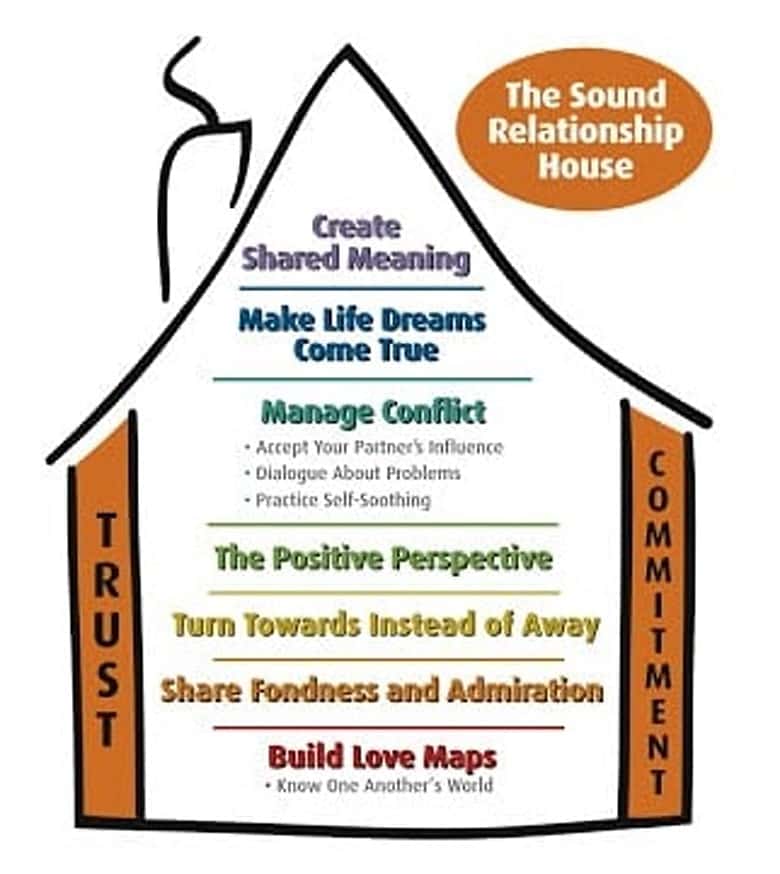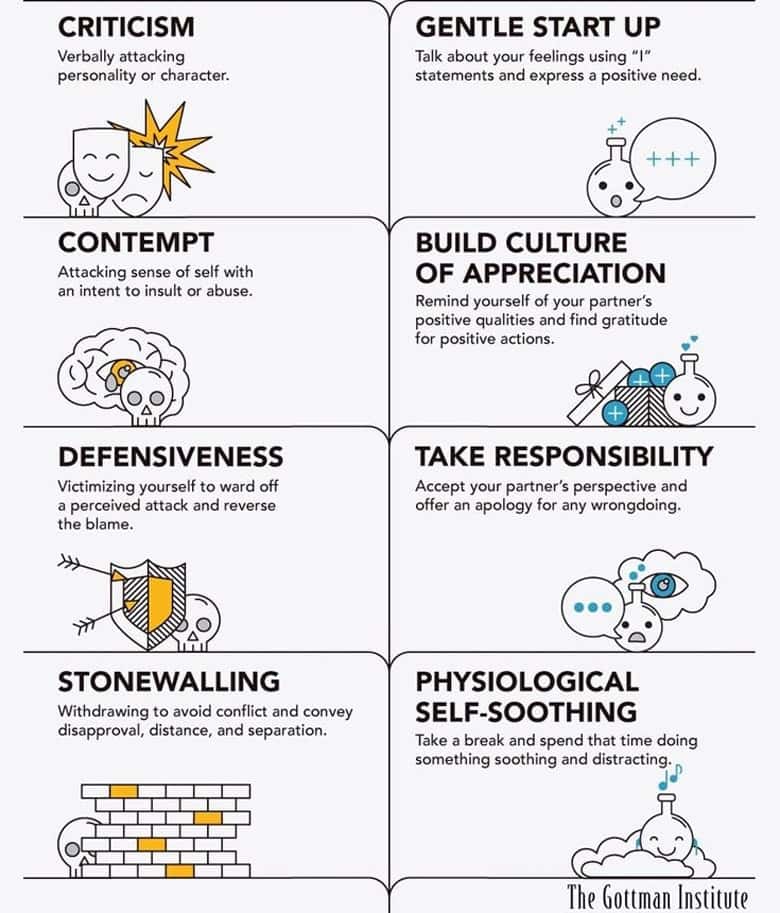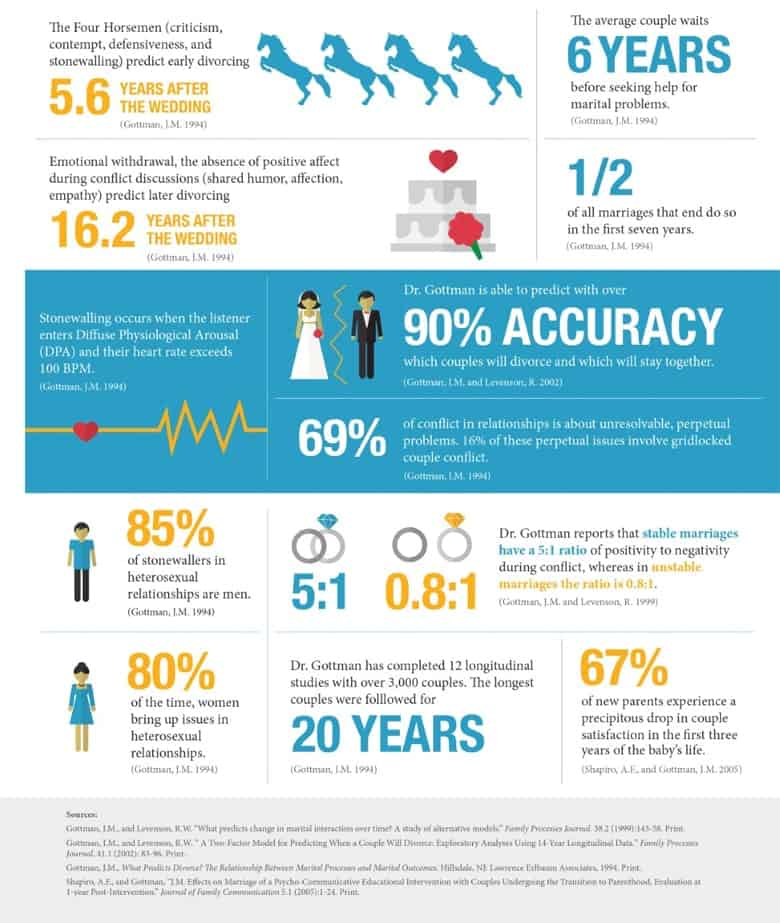The Gottman Method is a well known approach to Couples Therapy developed by John Gottman and his wife Julie. It’s based on the idea that a healthy relationship is built on a foundation of trust, respect, and positive communication. The Gottman Method focuses on helping couples improve their communication skills so they might manage their conflicts more effectively, and hopefully strengthen instead of weakening their emotional connection. It’s a research-based approach that has been shown to help couples
Sound Relationship Theory is Core to the Gottman Method
The Sound Relationship House Theory is a framework developed by John and Julie Gottman to understand the key elements that contribute to a healthy relationship. The theory is based on the idea that a relationship is like a house, with each element representing a different aspect of the relationship.
The nine elements of the Sound Relationship House Theory are:
- Build Love Maps: Knowing each other’s inner world and daily life.
- Share Fondness and Admiration: Expressing appreciation and respect for one another.
- Turn Toward Each Other: Responding to bids for emotional connection.
- The Positive Perspective: Interpreting events in a way that is positive and constructive.
- Manage Conflict: Handling conflicts in a healthy way.
- Make Life Dreams Come True: Supporting each other’s goals and aspirations.
- Create Shared Meaning: Finding purpose and meaning in life together.
- Trust: Establishing and maintaining trust in the relationship.
- Commitment: Making a long-term commitment to the relationship and working to maintain it.
The Sound Relationship House Theory provides a framework for couples to understand the key elements of a healthy relationship and to identify areas where they can work to improve their relationship.

What are Gottman’s Four Horsemen of the Apocalypse?
Four Horsemen of the Apocalypse is a term coined by John Gottman to describe the four behaviors that are most damaging to a relationship. These are criticism, contempt, defensiveness, and stonewalling. These behaviours are called the “Four Horsemen” because they are seen as destructive forces that can erode the foundation of a relationship and lead to the breakdown of communication and connection.
- Criticism: Criticism is a negative evaluation of your partner’s character, rather than a specific behavior. For example, instead of saying “I don’t like it when you leave dirty dishes in the sink”, a critical statement would be “You’re always so messy and inconsiderate”.
- Contempt: Contempt involves disrespect, mocking, or condescending behavior towards your partner. It is often conveyed through tone of voice, eye-rolling, or sarcastic comments.
- Defensiveness: Defensiveness is an attempt to deflect blame or responsibility for a problem. Instead of taking responsibility for their own actions or contributions to a problem, a defensive partner will try to shift the blame to the other person.
- Stonewalling: Stonewalling is when one partner shuts down or withdraws from the conversation, refusing to engage or communicate with the other person. This can be emotionally and physically distancing oneself from the other person, or simply refusing to discuss the issue at hand.
The Four Horsemen are often seen as warning signs that a relationship is in trouble, and addressing these behaviors is an important part of the Gottman Method for couples therapy.

What are Gottman’s Precursors for Divorce?
John Gottman, a leading researcher on relationships and marriage, has identified several behaviors that are predictive of divorce. These behaviors, known as the “Four Horsemen of the Apocalypse” (criticism, contempt, defensiveness, stonewalling), are seen as particularly damaging to a relationship and can erode the emotional connection between partners.
In addition to the Four Horsemen, Gottman has identified several other behaviors that are predictive of divorce, including:
- Lack of positive interactions: A lack of positive interactions, such as expressions of love, appreciation, and support, can indicate that a relationship is in trouble.
- Lack of repair attempts: Repair attempts are small gestures or behaviors that help to de-escalate conflict and rebuild connection. If these attempts are not being made, it can be a sign that a relationship is struggling.
- Flooding: Flooding is a term used to describe a state of emotional overwhelm that can occur during a conflict. If one or both partners frequently become overwhelmed and unable to communicate effectively during conflicts, it can be a predictor of divorce.
- Criticism and contempt: Criticism and contempt, as described in the Four Horsemen, are particularly damaging behaviors that can lead to a breakdown in communication and connection.
- Lack of trust: Trust is a fundamental component of a healthy relationship, and a lack of trust can lead to a breakdown of the relationship.
By recognizing these behaviors and working to address them, couples can improve their relationship and increase their chances of a long-lasting, healthy partnership.

Why does Gottman recommend Creating Shared Meaning?
“Creating Shared Meaning” is one of the nine elements of the Sound Relationship House Theory, a framework developed by John Gottman to understand the key elements of a relationship. The process involves finding purpose and meaning in life together as a couple. This can involve shared goals, values, and beliefs, as well as a shared sense of purpose and direction in life.
Creating shared meaning can be an ongoing process in a relationship, and can involve activities such as:
- Discussing your individual goals and aspirations and finding ways to support each other in achieving them.
- Identifying shared values and beliefs and finding ways to align your actions and decisions with these values.
- Engaging in activities that are meaningful to both of you, such as volunteering or pursuing shared hobbies or interests.
- Discussing your vision for the future and finding ways to work towards it together.
Creating shared meaning is an important aspect of a healthy relationship, as it helps to foster a sense of connection and purpose between partners. By creating shared meaning, couples can feel more connected and motivated to work together towards their goals and aspirations.
Why Does Gottman Recommend Building Love Maps?
“Building Love Maps” is one of the nine elements of the Sound Relationship House Theory, a framework developed by John Gottman to understand the key elements of a strong, healthy relationship. According to Gottman, “building love maps” involves knowing and understanding your partner’s inner world, including his or her hopes, dreams, goals, and stressors. Building love maps means listening to your partner, and asking them questions about their life and experiences, and expressing interest and care for their well-being.
Some ways to build Love Maps in your relationship might include:
- Asking your partner about their day, their thoughts and feelings, and their experiences.
- Listening actively and without interrupting when your partner is talking.
- Asking follow-up questions to show that you are paying attention and interested in what they have to say.
- Expressing care and concern for your partner’s well-being and showing interest in their life.
Building Love Maps helps to create a strong emotional connection between partners and can increase feelings of intimacy and trust in a relationship. It is an important aspect of a healthy, lasting relationship.
How AERCS Utilizes the Gottman Method in our Therapeutic Offerings
The AERCS team consists of Masters Level Registered Social Workers and Registered Psychotherapists who each have at minimum 15- 30 years of clinical experience. We are currently offering virtual sessions as well as in-person appointments at our clinics in Orangeville and Toronto, Ontario. Our therapists use Gottman Method’s approach as we examine the three tiers of a successful relationship.
- Friendship. Fondness and admiration, expressing appreciation and respect, gauging the trust and commitment in the relationship, intimacy in the relationship, turning towards each other instead of away, the ability to communicate well and have an intimate conversation with your partner.
- Conflict Resolution. Taking the harsh start up out of conflict patterns, learning “fair fighting”. Addressing what Gottman calls the “four horseman”; contempt, defensiveness, criticism and stonewalling. Eliminating these in conflict discussions and replacing them with healthy, productive communication patterns.
- Goals and Values. Are your life goals and life values aligned with one another? Do you know what your partner’s goals and dreams are? Making life dreams come true, creating “shared meanings”.
AERCS Couples Counselling sessions start with a two-part assessment.
First is a ninety minute session where your therapist will learn what has brought you her office. She will learn about your relationship from the very beginning, until present time. You will share what brought you together years ago, and what difficulties you’re facing today. Your therapist will make a recommendation as to the amount and frequency of sessions going forwards.
The second session is broken into two 45 minute individual sessions where your therapist will learn about your individual concerns. She will learn about your families’ origins and any individual challenges that you’re facing. At this point you will have been given a detailed and comprehensive questionnaire to complete.
The third session brings both partners back together. Your therapist will have your questionnaires scored and will go over the detailed feedback and results with you. You will also be given a treatment package with resources and exercises to work on.
While there is no set amount of sessions recommended with the Gottman Method, most couples find six to eight appointments is the best experience. Take the first step and experience meaningful change in your relationship, call AERCS for couples counselling at AERCs.












